Brazil dam disaster victims protest at BHP’s Adelaide AGM
Brazilians impacted by the Samarco dam environmental disaster in 2015 protested at mining giant BHP’s annual general meeting today in Adelaide as they seek $US44 billion in damages through a class action lawsuit.

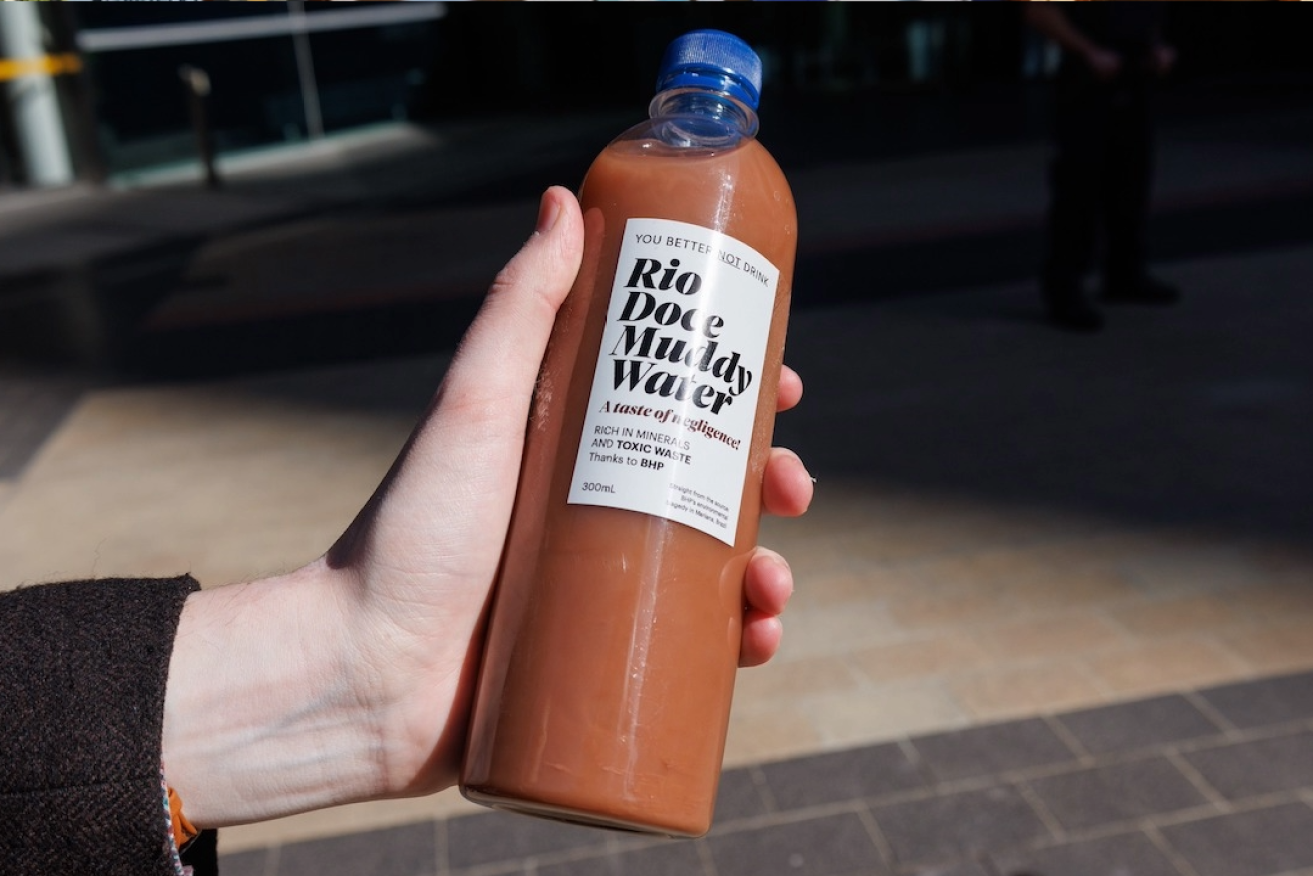
A bottle of contaminated water carried by protesters at today's BHP AGM. Photo: Tony Lewis/InDaily
A small crowd of protestors gathered outside the Adelaide Convention Centre this morning ahead of the AGM.
Representatives from Brazilian communities impacted by the Samarco dam disaster were present, including sand miner Edertony Jose da Silva.
Da Silva said members of his community and the more than 700,000 others who make up a $US44 billion class action lawsuit had waited eight years for justice following the Fundão tailings dam collapse.
“We are here in the hope of bringing the truth to shareholders of this company, because we’ve been fighting for eight years and everybody needs to know the truth,” said da Silva, who flew to Adelaide for the AGM.
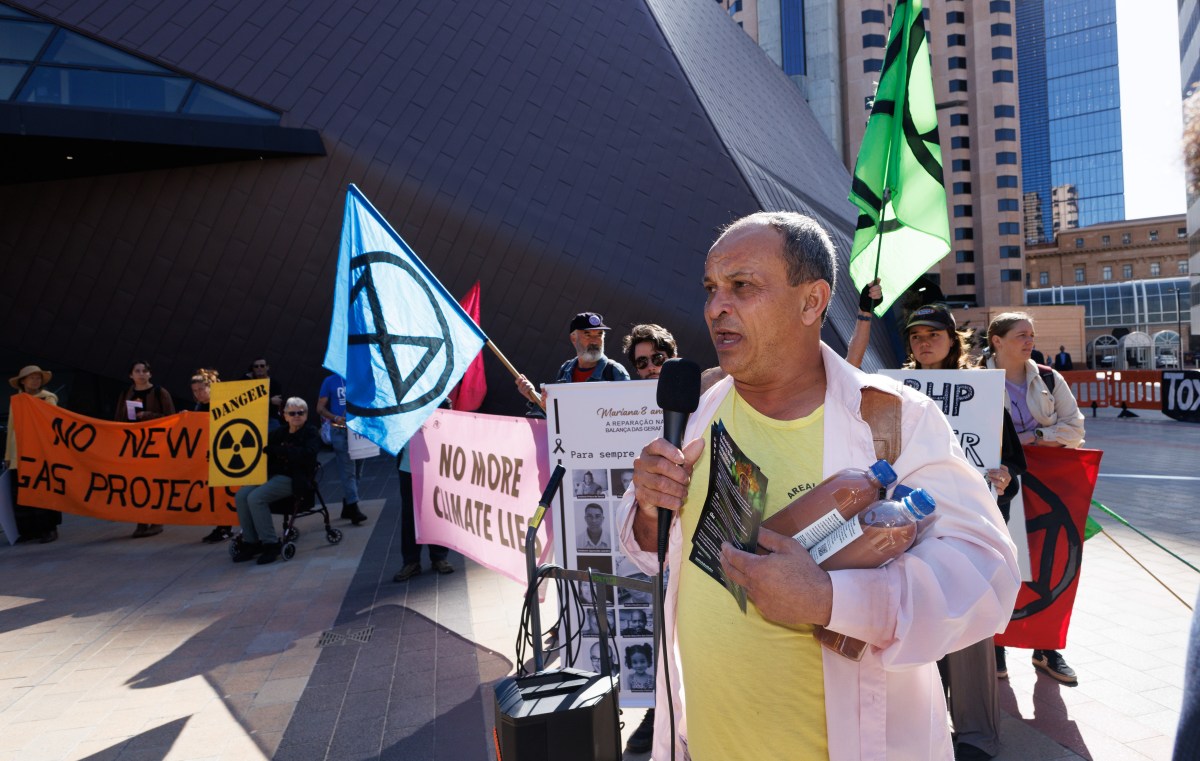
Brazilian protester Edertony Jose Da Silva. Photo: Tony Lewis/InDaily
“These record profits that they have are based on Brazilian lives, Brazilian blood, Brazilian workers that have been striving for eight years to get the minimum compensation that BHP refused to give.
“We are here. We came from Brazil. We’re here to fight and we will keep fighting every day until we get due reparations.”
The native Brazilians are part of a more than 700,000-strong base of class action members seeking compensation from BHP in what is believe to be the world’s largest environmental class action of its kind.
The class action members claims the environmental disaster led to 40 million cubic metres of toxic mining waste flowing into 700km of waterways along the River Doce.
BHP denies the allegations and will defend the class action.
Speaking at the AGM, chairman Ken MacKenzie admitted the company’s reconstruction and redress efforts in Brazil had “taken longer than we would have liked”.
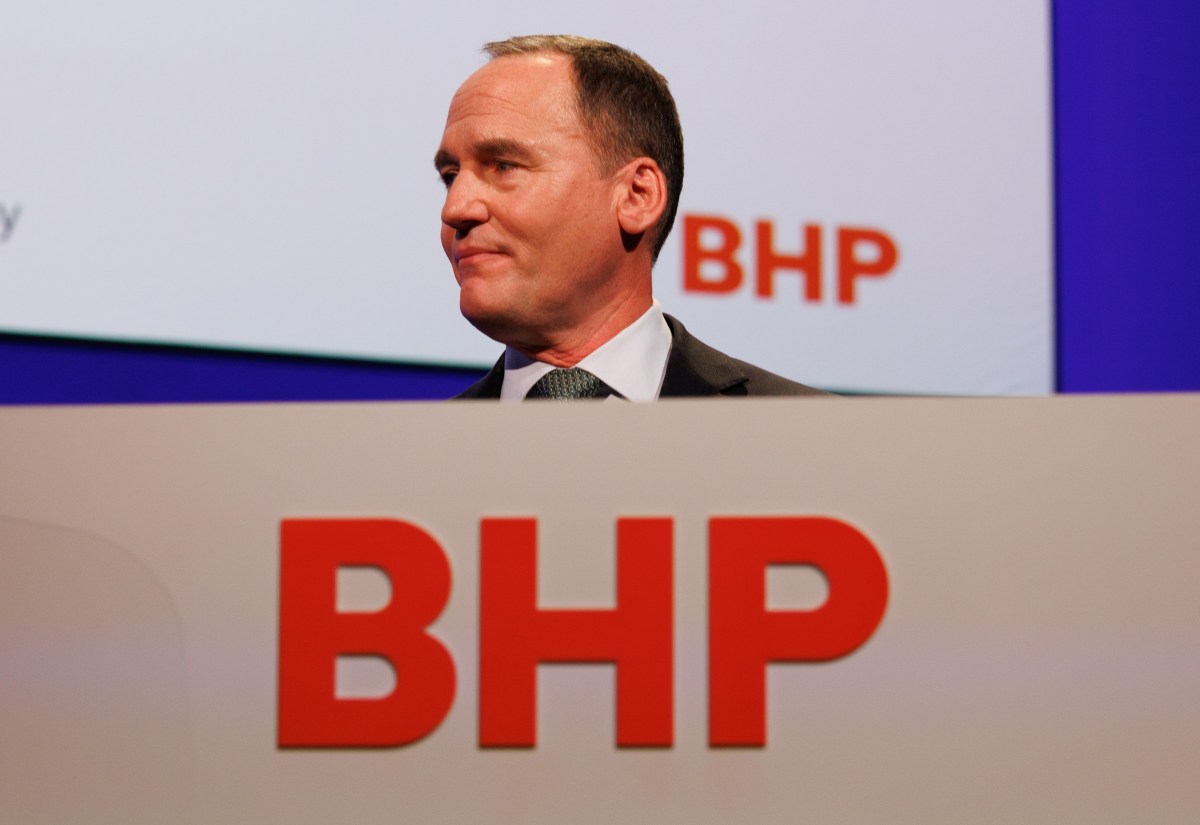
BHP chair Ken MacKenzie. Photo: Tony Lewis/InDaily
However, he added that a not-for-profit established to provide compensation to impacted Brazilians called the Renova Foundation had been distributing $2 million per month to affected individuals.
“All up since the dam failure, Renova has to-date spent more than $6.4 billion on remediation,” McKenzie said.
“We still have a provision of $3.7 billion dollars – so the compensation isn’t complete; it’s ongoing.”
As for the lawsuit in the UK, MacKenzie said BHP would “continue to defend the class action and we deny those claims”.
“In our view the UK action overlaps what’s going on in Brazil and effectively it’s a duplication of what’s going on in Brazil,” he said.
“It’s a little messy, but we deny those claims and we plan on defending that UK action.
“The Samarco Dam failure was a tragedy and we’re deeply sorry. The remediation has taken longer than we would have liked.”
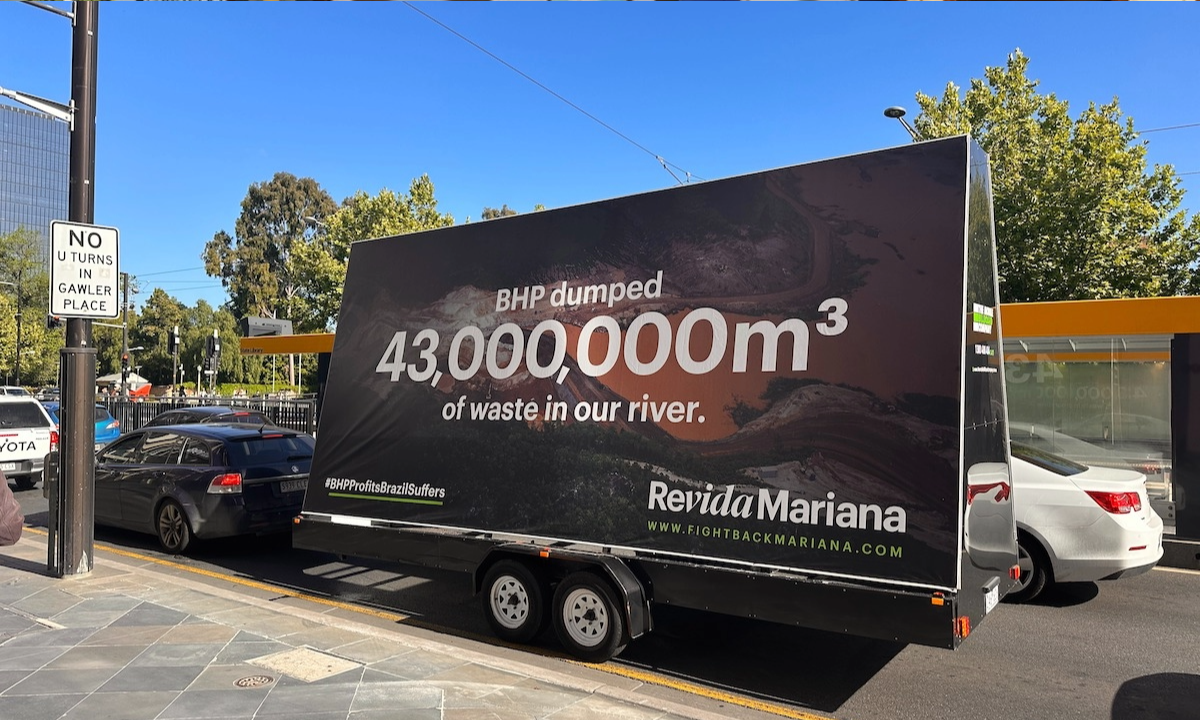
A protest sign in Adelaide this morning. Photo: David Simmons/InDaily
At the AGM, Brazilian sand miner da Silva said he had “come halfway across the world to be here at this moment today”.
“Now I can tell everybody who’s here what is really happening. It is not okay, the river is still polluted, there are 700,000 people that are impacted and have been displaced,” he said.
“Eight years has gone by and we are still going on about the same topic. I’m afraid we’re going to keep talking about it in years to come.”
He asked the chairman if the company would review the money set aside for the compensation program.
“I appreciate you’ve come halfway around the world to attend this meeting,” MacKenzie said.
“Clearly there are differing viewpoints here on where we are in the process but we are not done. We’re definitely not done. We’ve always been committed to full and fair redress of the damage from day one.”
The Samarco mine was operated through a joint venture between BHP and Brazilian miner Vale, with the collapsed Fundão tailings dam constructed to accommodate waste resulting from iron ore extraction.
When the dam collapsed, the toxic waste containing heavy metals, arsenic, mercury, nickel and aluminium flooded into the River Doce and killed 19 people. At the time, the river was used for irrigation and drinking water.
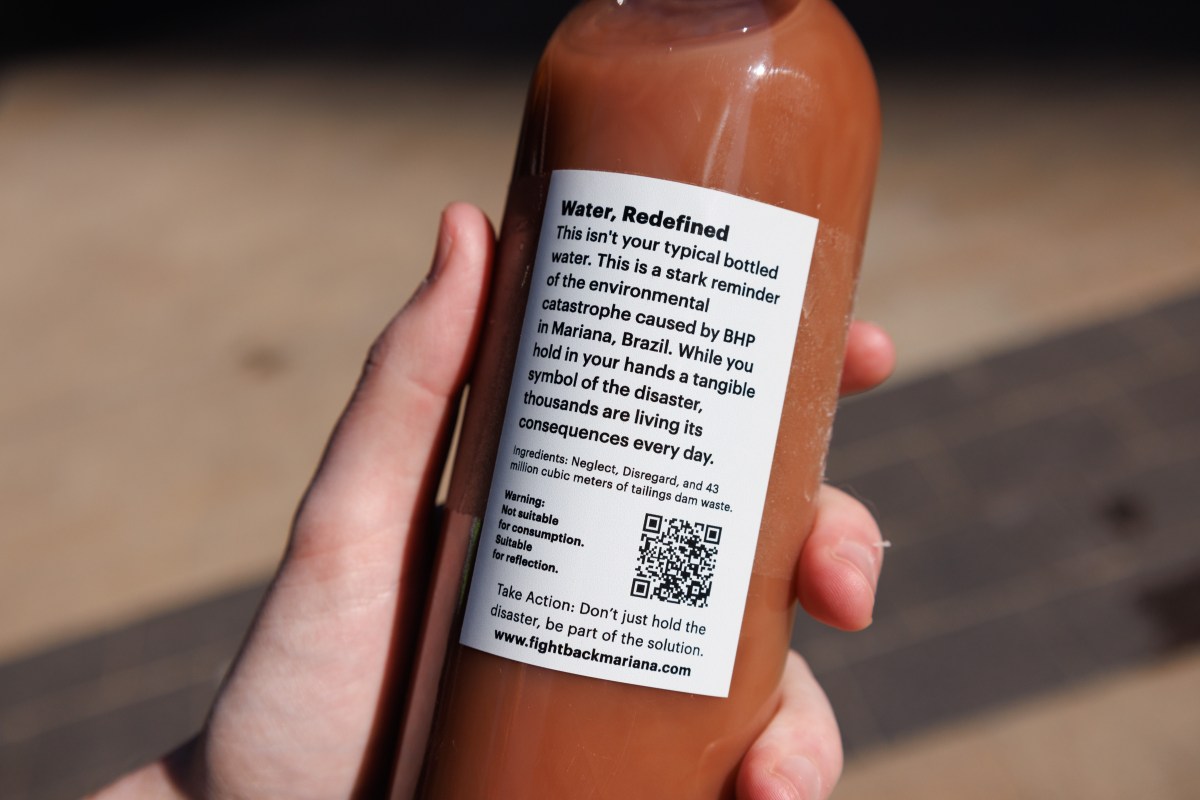
A bottle of water carried by protesters at the BHP AGM. Photo: Tony Lewis/InDaily
In addition to the 700,000 individuals, 46 municipalities and 2500 businesses, government agencies and faith-based institutions have banded together to fight the Australian mining giant which recently acquired SA copper miner OZ Minerals.
It has been a long legal battle for the class action members, represented by law firm Pogust Goodhead, who had their first lawsuit thrown out by a Hight Court Judge in Manchester in 2020. That Judge ruled the largest group claim in English legal history would be like “trying to build a house of cards in a wind tunnel” and that it was “an abuse of the process of the court”.
The Court of Appeal agreed with the Manchester Judge in 2021, and also ruled the class action would be an abuse of process considering litigation was already taking place in Brazil.
However, in May 2021 the London Court of Appeal heard a request to revive the claim. This time, the Court ruled the class action would be able to proceed, stating: “Whilst we fully understand the considerations that led the Judge to his conclusion that the claim should be struck out, we nevertheless believe that the appeal has a real prospect of success”.
In March 2023 BHP requested a 15-month delay, which would shift the scheduled trial into 2025 – one decade on from the disaster. This was rejected by the Supreme Court and a trial date is currently set for October 2024.
“Eight years after, the Doce River is dead, those affected remain without their homes and families are mourning the death of loved ones,” Pogust Goodhead said.
“Multimillion-dollar companies that have profited and continue to profit at the expense of the suffering and the exploitation of nature refuse to offer full and fair redress.
“It is time for BHP and Vale to do the right thing and engage with the claimants in this case to achieve an effective resolution.”
The BHP board used the AGM as an opportunity to promote the “significant” acquisition of South Australian copper miner OZ Minerals.
Completed in May, the $9.6 billion deal created a ‘copper province’ in SA – bringing OZ Minerals’ Prominent Hill and Carapateena mines together with BHP’s Olympic Dam operation.
“Bringing OZ into BHP creates the potential for further growth in the near and long term, in the newly aggregated copper province for BHP assets here in South Australia,” CEO Mike Henry said.
“We believe that with stable and competitive government policies in South Australia, there will be a strong case for future capital investment in these assets relative to other potential investment options in our portfolio.
“I really do want to thank Premier Malinauskas and his government for the constructive way we are working together towards delivering this shared objective.”




